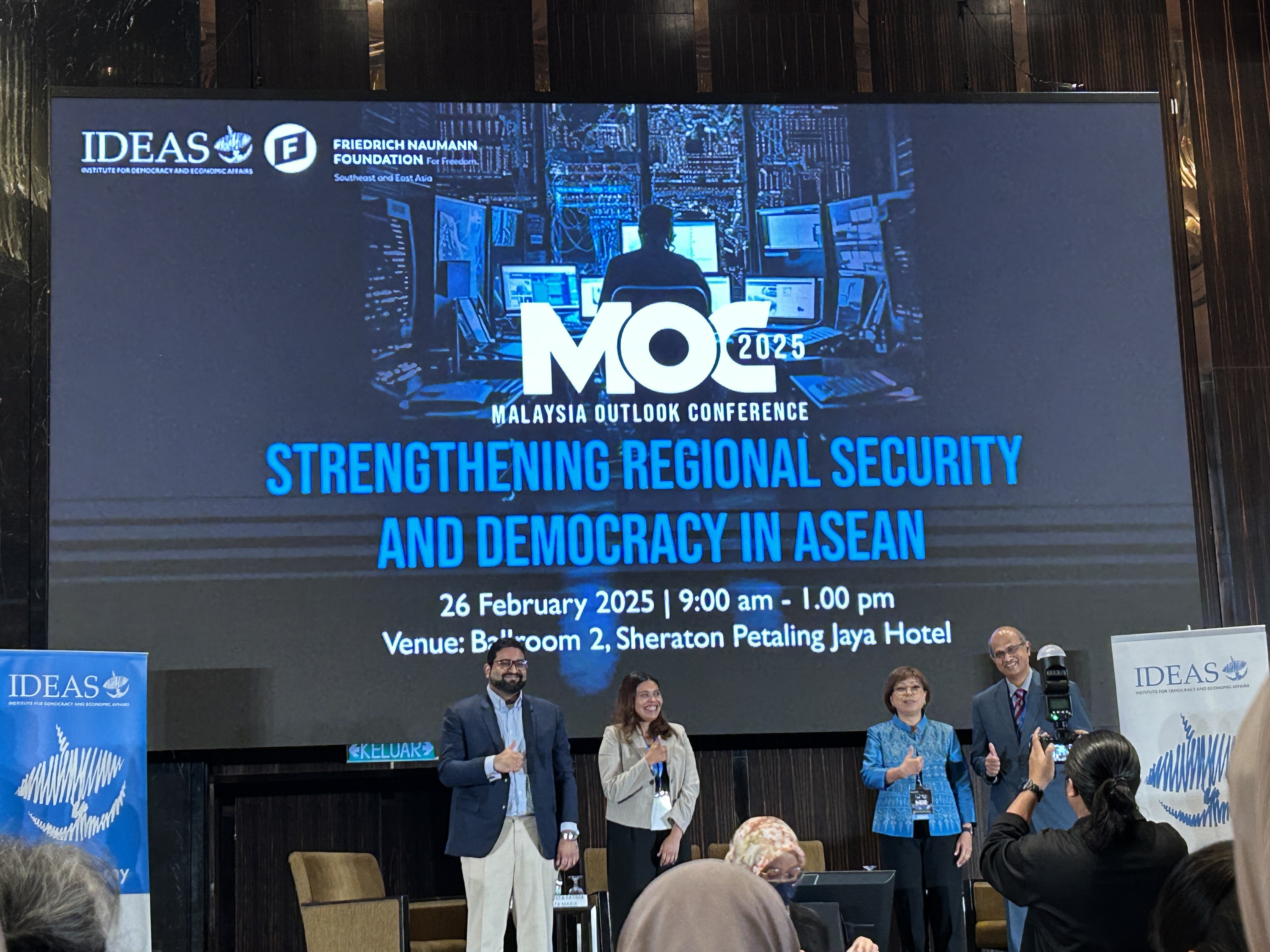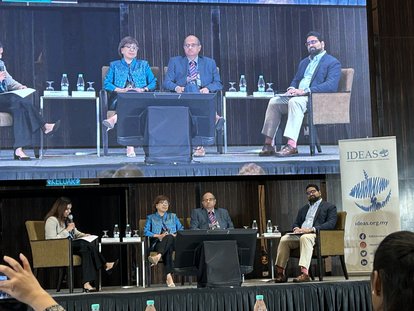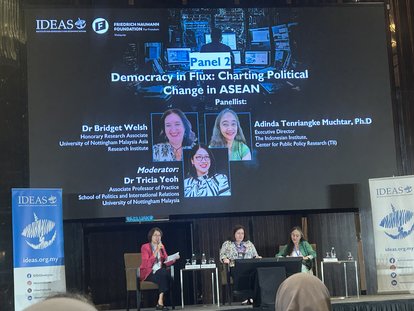Event
Malaysia Outlook Conference 2025: Strengthening Regional Security and Democracy in ASEAN

Malaysia Outlook Conference 2025, hosted on February 26th, 2025, at Sheraton Petaling Jaya Hotel.
© FNF MalaysiaThe Malaysia Outlook Conference, organised annually by IDEAS Malaysia in partnership with FNF Malaysia, continues in 2025 with a timely theme that coincides with Malaysia’s ASEAN Chairmanship. The event, which took place on February 26th, was arranged into two panels featuring distinguished speakers with expertise in both Malaysian and Southeast Asian economic and political trends and developments. The conference began with a keynote address from Tan Sri Datuk Dr. Rebecca Fatima Sta Maria (Immediate Past Executive Director of the Asia-Pacific Economic Cooperation (APEC) Secretariat as well as current IDEAS board member). Dr. Rebecca briefly touched upon several regional security issues presently surrounding ASEAN, including maritime security pressures and geoeconomic tensions among the member states. This brief introduction further served well as a bridge into the discussions in Panel 1, in which Dr. Rebecca became one of the panelists, on the topic of 𝗔𝗦𝗘𝗔𝗡 𝗖𝗵𝗮𝗶𝗿𝗺𝗮𝗻𝘀𝗵𝗶𝗽: 𝗠𝗮𝗹𝗮𝘆𝘀𝗶𝗮’𝘀 𝗟𝗲𝗮𝗱𝗲𝗿𝘀𝗵𝗶𝗽 𝗶𝗻 𝗡𝗮𝘃𝗶𝗴𝗮𝘁𝗶𝗻𝗴 𝗥𝗲𝗴𝗶𝗼𝗻𝗮𝗹 𝗦𝗲𝗰𝘂𝗿𝗶𝘁𝘆 𝗖𝗵𝗮𝗹𝗹𝗲𝗻𝗴𝗲𝘀

𝗣𝗮𝗻𝗲𝗹 𝟭: 𝗔𝗦𝗘𝗔𝗡 𝗖𝗵𝗮𝗶𝗿𝗺𝗮𝗻𝘀𝗵𝗶𝗽: 𝗠𝗮𝗹𝗮𝘆𝘀𝗶𝗮’𝘀 𝗟𝗲𝗮𝗱𝗲𝗿𝘀𝗵𝗶𝗽 𝗶𝗻 𝗡𝗮𝘃𝗶𝗴𝗮𝘁𝗶𝗻𝗴 𝗥𝗲𝗴𝗶𝗼𝗻𝗮𝗹 𝗦𝗲𝗰𝘂𝗿𝗶𝘁𝘆 𝗖𝗵𝗮𝗹𝗹𝗲𝗻𝗴𝗲𝘀. From left to right: Sharmila Suntherasegarun, Dr. Rebecca Fatima Sta Maria. Dato’ Dr. Ilango Karuppannan, and Thomas Benjamin Daniel.
© FNF MalaysiaIn this panel, moderated by Sharmila Suntherasegarun (Assistant Manager, Economic and Business Unit at IDEAS Malaysia), Dr. Rebecca was joined by Dato’ Dr. Ilango Karuppannan (Former Malaysian High Commissioner to Singapore; Adjunct Professor at Universiti Malaya) and Thomas Benjamin Daniel (Senior Fellow, Foreign Policy and Security Studies at Institute for Strategic and International Studies (ISIS) Malaysia). The three panelists concurred with the argument that Malaysia needs to tap into its own diplomatic and foreign affairs resources to build trust and consensus among the ASEAN members through sustained conversations beyond ASEAN’s formal quarterly meetings. And only through such diligent measures, they believe, can Malaysia utilise its chairmanship to have ASEAN member states get through their contesting interests for a more cohesive action plan in regards to present regional security issues.
In similar veins, the second panel, moderated by Dr. Tricia Yeoh (Associate Professor of Practice School of Politics and International Relations, University of Nottingham Malaysia), also broached the subject of another challenge threatening the region, which is the democracy backsliding of several ASEAN member states. Dr. Bridget Welsh (Honorary Research Associate, University of Nottingham Malaysia, Asia Research Institute) and Dr. Adinda Tenriangke Muchtar (Executive Director, The Indonesian Institute) were invited as panelists. Both scholars raised a few issues regarding the rise of cartel politics and toxic political alliances in ASEAN member states. In Dr. Adinda’s case, the focus was then specified on Indonesia – which recently appointed a former general with ties to the country’s dictatorial past and alleged human rights abuses as the president. Moreover, the democratic backsliding in ASEAN is presently exacerbated by the emergence and increasing prevalence of ‘scam economy’, with traces of the funds even getting tracked into the accounts of the Junta and some of the ethnic armed groups in Myanmar.

𝗣𝗮𝗻𝗲𝗹 𝟮: 𝗗𝗲𝗺𝗼𝗰𝗿𝗮𝗰𝘆 𝗶𝗻 𝗙𝗹𝘂𝘅: 𝗖𝗵𝗮𝗿𝘁𝗶𝗻𝗴 𝗣𝗼𝗹𝗶𝘁𝗶𝗰𝗮𝗹 𝗖𝗵𝗮𝗻𝗴𝗲 𝗶𝗻 𝗔𝗦𝗘𝗔𝗡. From left to right: Dr. Tricia Yeoh, Dr. Bridget Welsh, and Dr. Adinda Tenriangke Muchtar.
© FNF MalaysiaThe discussions concluded with a Q and A session, where the participants get to ask questions to the panelists. Both panels wrapped up with the understanding that Malaysia’s ASEAN Chairmanship will be able to deliver its ambitious goals only by putting in the work to engage every stakeholder in conversations on a continuous basis. There is a lot of backroom work that needs to be done. Bridging differences and finding a common ground among various member states with equally diverse interests will not be satisfied through occasional formal meetings alone.
Watch clips from the conference here: Malaysia Outlook Conference 2025.
